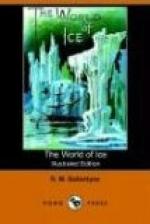It was a lovely Arctic day. The sun shone with unclouded splendour, and the bright air, which trembled with that liquidity of appearance that one occasionally sees in very hot weather under peculiar circumstances, was vocal with the wild music of thousands of gulls, and auks, and other sea-birds, which clustered on the neighbouring cliffs and flew overhead in clouds. All round the pure surfaces of the ice-fields were broken by the shadows which the hummocks and bergs cast over them, and by the pools of clear water which shone like crystals in their hollows, while the beautiful beryl blue of the larger bergs gave a delicate colouring to the dazzling scene. Words cannot describe the intense glitter that characterized everything. Every point seemed a diamond, every edge sent forth a gleam of light, and many of the masses reflected the rich prismatic colours of the rainbow. It seemed as if the sun himself had been multiplied in order to add to the excessive brilliancy, for he was surrounded by parhelia, or sun-dogs, as the men called them. This peculiarity in the sun’s appearance was very striking. The great orb of day was about ten degrees above the horizon, and a horizontal line of white passed completely through it, extending to a considerable distance on either hand, while around it were two distinct halos, or circles of light. On the inner halo were situated the mock-suns, which were four in number—one above and one below the sun, and one on each side of him.
Not a breath of wind stirred the little flag that drooped from the mizzen-peak, and the clamorous, ceaseless-cries of sea-birds, added to the merry shouts and laughter of the men as they followed the restless football, rendered the whole a scene of life, as it was emphatically one of beauty.
“Ain’t it glorious?” panted Davie Summers vehemently as he stopped exhausted in a headlong race beside one of his comrades, while the ball was kicked hopelessly beyond his reach by a comparatively fresh member of the party.
“Ah! then, it bates the owld country intirely, it does,” replied O’Riley, wiping the perspiration from his forehead.
It is needless to say that O’Riley was an Irishman. We have not mentioned him until now, because up to this time he had not done anything to distinguish himself beyond his messmates; but on this particular day O’Riley’s star was in the ascendant, and fortune seemed to have singled him out as an object of her special attention. He was a short man, and a broad man, and a particularly rugged man—so to speak. He was all angles and corners. His hair stuck about his head in violently rigid and entangled tufts, rendering it a matter of wonder how anything in the shape of a hat could stick on. His brow was a countless mass of ever-varying wrinkles, which gave to his sly visage an aspect of humorous anxiety that was highly diverting—and all the more diverting when you came to know that the man had not a spark of anxiety in his composition, though he often said he had. His dress, like that of most Jack tars, was naturally rugged, and he contrived to make it more so than usual.




